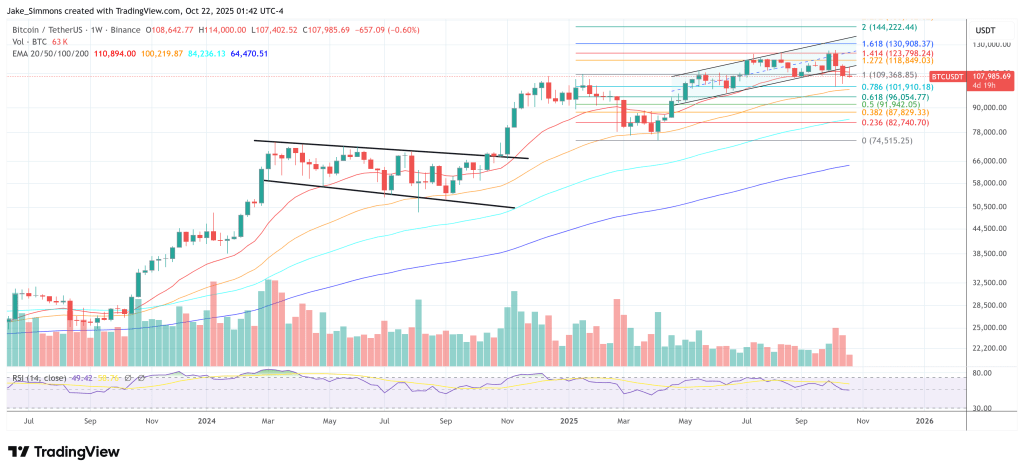
Federal Reserve Governor Christopher J. Waller said Bitcoin “was going to end up being something like electronic gold,” describing the asset as a non-yielding store of value whose price is sustained by collective belief rather than cash flows. The remarks came on October 21, 2025, during a “Crypto in America” livestream, and they track with Waller’s longer-running view that bitcoin functions more like a belief-driven commodity than a payments instrument.
Bitcoin Is ‘Like Electronic Gold’
“Look, I have always argued that Bitcoin was going to end up being something like electronic gold. It’s a store of value. It promises no return. It’s just, you buy it and hold it for some appreciation. That’s exactly what you do. It’s commodities like gold. That’s it. There’s nothing wrong with it. It has a positive price. It doesn’t have any fundamental value. I don’t think gold has really any fundamental value either,” Waller said, before adding that assets like gold and BTC can sustain prices through “belief equilibrium”—the expectation that someone else will pay more later.
The “electronic gold” framing is not new for Waller. In prior appearances, he has argued that most crypto assets have little intrinsic worth but that bitcoin sits apart as a wealth-preservation vehicle, akin to collectibles or precious metals that persist because markets accept them as stores of value. In one such discussion, he put it plainly: “Bitcoin to me is basically electronic gold… It doesn’t have any fundamental intrinsic value, but that’s okay.”
JUST IN: 🇺🇸 Fed Governor Waller says Bitcoin is “like electronic gold.” pic.twitter.com/IOY1892pKs
— Bitcoin Archive (@BTC_Archive) October 21, 2025
Waller’s latest comments land as the Fed itself convenes policy and technology circles around digital assets and payments innovation. Coverage of his October 21 remarks—delivered as part of the central bank’s opening to a payments-innovation agenda—emphasized both his characterization of BTC and his suggestion that the Fed should explore narrower access models to its rails for innovators, an implicit nod to crypto-native firms.
The “digital gold” analogy has also been adopted—sometimes quite explicitly—by Waller’s boss. In December 2024, Federal Reserve Chair Jerome Powell said at the New York Times DealBook Summit that people use bitcoin “as a speculative asset,” calling it “like gold—it’s just virtual and digital,” and stressing that BTC competes with gold, not the US dollar. Powell’s phrasing has since been widely cited as the clearest articulation from a sitting Fed Chair that BTC’s closest analogue is gold.
Powell’s 2024 comments also echoed an even earlier stance: in testimony and public remarks dating back years, he has repeatedly described bitcoin as a speculative store of value “like gold,” a view that markets have tended to interpret as de-emphasizing bitcoin’s near-term role in payments while acknowledging its entrenchment as a bearer asset in portfolios.
Together, the Waller and Powell statements further entrench a delineation that has become common among monetary officials: BTC as a non-yielding, belief-anchored store of value, distinct from both bank money and stablecoins designed for transactional use. Meanwhile, Fed governor Barr recently warned that the GENIUS Act could shield Bitcoin from the central bank’s oversight.
At press time, BTC traded at $107,985.

Featured image created with DALL.E, chart from TradingView.com

Editorial Process for bitcoinist is centered on delivering thoroughly researched, accurate, and unbiased content. We uphold strict sourcing standards, and each page undergoes diligent review by our team of top technology experts and seasoned editors. This process ensures the integrity, relevance, and value of our content for our readers.














